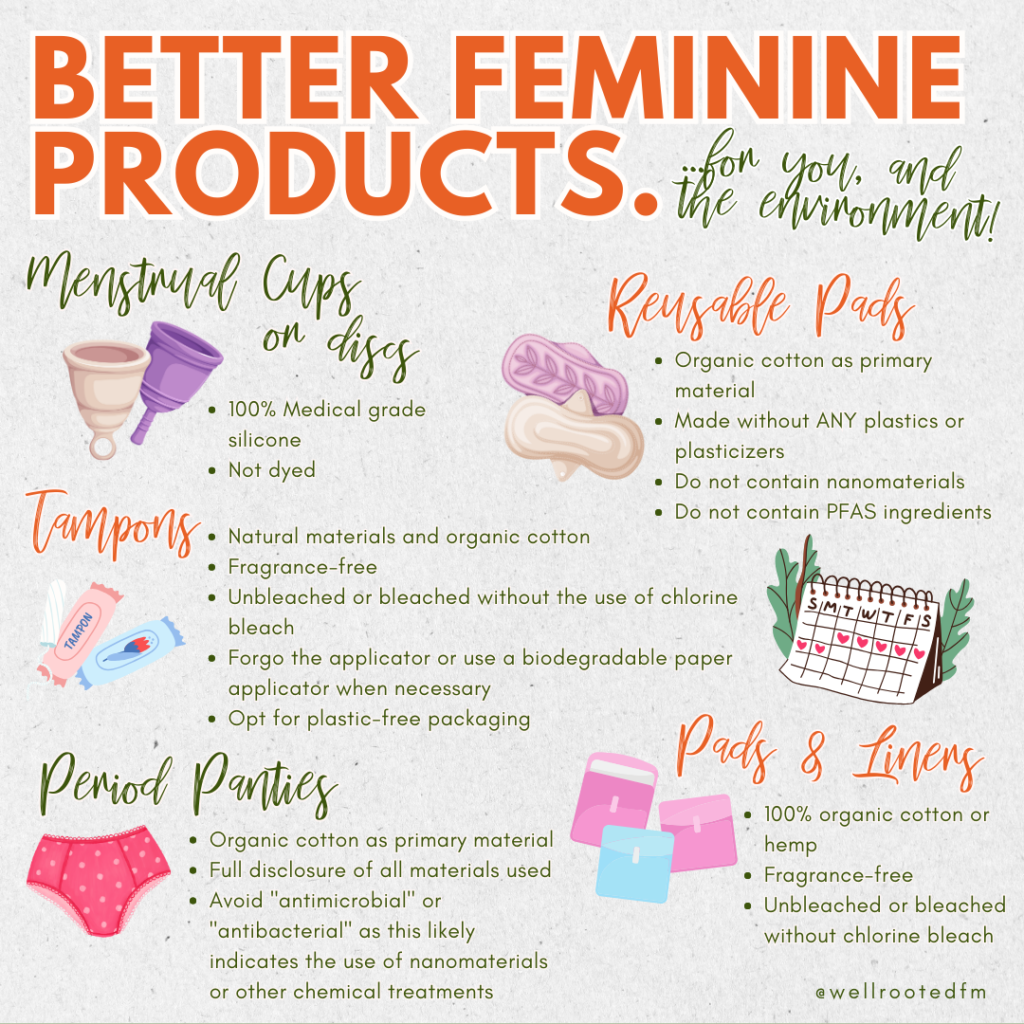Protect Your Health and the Planet: Make Informed Choices About Menstrual Products 🌿

Protect Your Health and the Planet: Make Informed Choices About Menstrual Products 🌿
When it comes to menstrual health, the products we choose can have a profound impact on our bodies and the environment. Over the course of a lifetime, a single menstruator will use somewhere between 5,000 and 15,000 tampons. 😱 Most American women will menstruate for about 40 years, bleeding for about five days a month, or roughly 2,400 days in total. That’s about six and a half years of continuous exposure to potential chemicals and toxins.
Understanding the Risks: Heavy Metals and Chemicals in Tampons
Recent studies have raised concerns about the presence of toxic metals and chemicals in tampons. Researchers have found heavy metals such as lead, arsenic, and cadmium in popular tampon brands. When administered vaginally, the levels of a drug in the body can be 10-80 times higher than when administered orally. This means that using tampons with heavy metals poses a significant health risk, as these metals can damage the cardiovascular, nervous, and endocrine systems, among other health issues.
Catherine Roberts, a health and science journalist at Consumer Reports, highlights the lack of research and regulation in this area. “It’s in the most sensitive part of people’s bodies. It’s so close to us,” she says. “We use so many [tampons] over a lifetime. It’s just wild to me that this is both so little researched and so little regulated.”
Concerning Chemicals in Menstrual Products
Aside from heavy metals, other harmful chemicals commonly found in pads and tampons include:
– Dioxins & Furans: Linked to cancer, endocrine disruption, and reproductive toxicity.
– Pesticide Residues: Some are linked to cancer and potential endocrine disruption.
– Plastics & Plasticizers: Linked to endocrine disruptions and cancer.
– Problematic Coatings: Some tampons are coated with harmful materials to help with a smoother removal.
– Undisclosed Fragrance Ingredients: May contain chemicals linked to cancer, endocrine disruption, and allergies.
Safer Alternatives for Your Health and the Environment
Given the potential risks associated with conventional menstrual products, it’s essential to explore safer alternatives:
Reusable Products 🌿♻️
– Menstrual Cups, Discs, and Period Panties: These options are not only better for your health but also for the planet. They can be washed, sanitized, and reused for years, reducing waste and pollution.
Organic Pads and Tampons 🌿
– Choose Products Free from Harmful Chemicals: Look for organic pads and tampons that use eco-friendly packaging and applicators. Ensure they are free from chlorine, fragrances, and deodorants to minimize exposure to harmful substances.
Environmental Impact of Disposable Menstrual Products
Conventional menstrual products are not only harmful to our bodies but also have a significant environmental impact. Disposable pads are estimated to take 500 to 800 years to break down, and materials such as plastic never truly biodegrade. Each menstruator will use and dispose of between 5,000 and 15,000 pads and tampons in their lifetime, contributing to massive waste and environmental pollution.
Make Informed Choices for Better Health and a Sustainable Future 🌟💚
While the unfortunate reality is that many women worldwide don’t have the luxury of choice in their personal care products, if you do, consider switching to sustainable, reusable menstrual products. If you prefer disposables, research manufacturers and choose organic options that prioritize health and environmental sustainability.
Take Control of Your Health 💪✨
By being mindful of our choices, we can protect our health and the environment. Say “NO” to plastics, toxic chemicals, and heavy metals in your feminine products. Choose safer, more sustainable menstrual products and make a positive impact on your well-being and the planet.
Together, let’s work towards better health and a sustainable future. 💚🌍

OUR LOCATIONS
Crystal Lake, IL
390 Congress Parkway Suite J, Crystal Lake, IL
Oak Brook, IL
814 Commerce Drive Ste 150 Oak Brook, IL 60523
HOURS OF OPERATION
Crystal Lake, IL
| Monday | 9am to 5pm |
| Tuesday | 9am to 5pm |
| Wednesday | 9am to 5pm |
| Thursday | 9am to 5pm |
| Friday | 9am to 5pm |
| Saturday | 1st, 2nd & 3rd Saturday Of The Month |
Oak Brook, IL
| Monday | 9am to 5pm |
| Tuesday | 9am to 5pm |
| Wednesday | 9am to 5pm |
| Thursday | 9am to 5pm |
| Friday | 9am to 5pm |
| Saturday | Closed |
Crystal Lake Office
390 Congress Parkway Suite J
Crystal Lake, IL
Phone 815-322-9300
Fax 815-322-9315
Email [email protected]
Oak Brook Office
814 Commerce Drive Ste 150
Oak Brook, IL 60523
Phone 815-322-9300
Fax 815-322-9315
Email [email protected]
Office Hours
Monday: 9am to 5pm
Tuesday: 9am to 5pm
Wednesday: 9am to 5pm
Thursday: 9am to 5pm
Friday: 9am to 5pm
Saturday: Varies By Location

